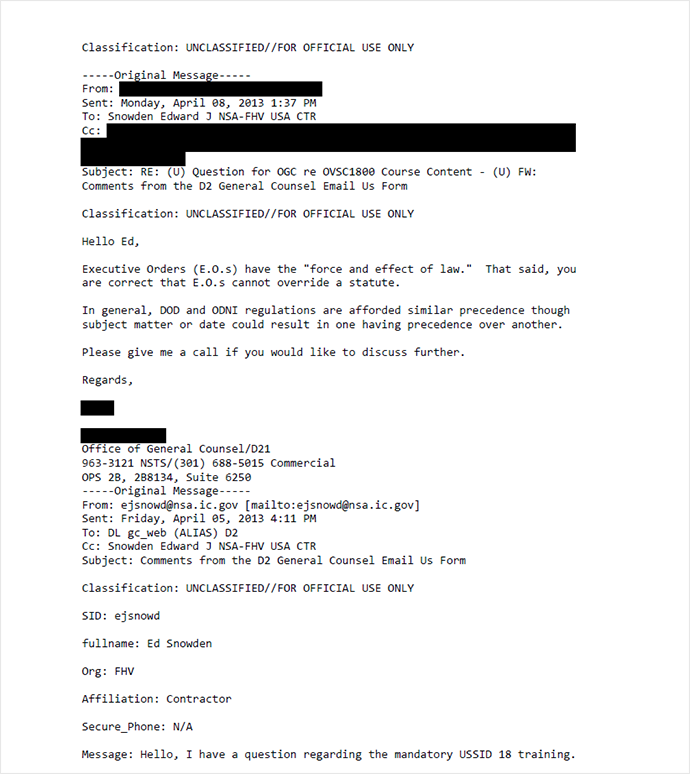
NSA releases Snowden email after denying its existence
The Unhived Mind
NSA releases Snowden email after denying its existence
Published time: May 29, 2014 20:18
http://rt.com/usa/162364-nsa-odni-email-snowden/
Former National Security Agency contractor Edward Snowden did raise questions with top NSA lawyers, the agency admitted on Thursday. Snowden responded by saying the released emails are incomplete, and that NSA misdirection “raises serious concerns.”
The Office of the Director of the National Intelligence announced through its website on Thursday that it has located a lone email inquiry sent by Mr. Snowden in April 2013 to the Office of General Counsel, confirming in part allegations the former contractor made during an interview with NBC’s Brian Williams that aired Wednesday evening.
“I actually did go through channels, and that is documented,” Snowden told Williams when the two sat down in Moscow for an interview recently. “The NSA has records, they have copies of emails right now to their Office of General Counsel, to their oversight and compliance folks, from me raising concerns about the NSA’s interpretations of its legal authorities.”
“I would say one of my final official acts in government was continuing one of these communications with a legal office. And in fact, I’m so sure that these communications exist that I’ve called on Congress to write a letter to the NSA to verify that they do,” Snowden said.
Yet the NSA has, until now, denied the existence of any such correspondence. In fact, previously the agency said any such emails simply couldn’t be found.
“After extensive investigation, including interviews with his former NSA supervisors and co-workers, we have not found any evidence to support Mr. Snowden’s contention that he brought these matters to anyone’s attention,” the NSA said last year.
This past March, Snowden testified before the European Parliament that he had reported “clearly problematic programs to more than ten distinct officials, none of whom took any action to address them,” before he took a trove of classified NSA documents and supplied them to national security journalists.
Thursday’s blog post from the ODNI falls short of confirming that he reached out to ten individuals, but it does for once discredit the NSA’s earlier statement concerning Mr. Snowden’s supposed failure to speak out about his issues through the appropriate channels.
In the April 5 email, the ODNI wrote, Snowden “did not raise allegations or concerns about wrongdoing or abuse, but posed a legal question that the Office of General Counsel addressed.”
Indeed, the email published on the ODNI’s blog shows that one month to the day before the first news articles based off of his leaks was published, Snowden pushed the Office of the General Counsel for answers about the hierarchy of governing authorities and documents. According to a screenshot posted by the ODNI, Snowden asked for clarification with regards to what authority, if any, presidential executive orders have over federal law, as well as who has precedence in matters between the ODNI and the Pentagon at large.
“There are numerous avenues that Mr. Snowden could have used to raise other concerns or whistleblower allegations,” the ODNI wrote with Thursday’s post. “We have searched for additional indications of outreach from him in those areas and to date have not discovered any engagements related to his claims.”
Snowden responds
Yet Snowden countered the ODNI release later on Thursday, saying that the offerings are an incomplete record of his correspondence with the Office of General Counsel.
“Today’s release is incomplete, and does not include my correspondence with the Signals Intelligence Directorate’s Office of Compliance, which believed that a classified executive order could take precedence over an act of Congress, contradicting what was just published,” Snowden told the Washington Post.
“It also did not include concerns about how indefensible collection activities – such as breaking into the back-haul communications of major US internet companies – are sometimes concealed under E.O. 12333 to avoid Congressional reporting requirements and regulations.”
He went on to say, as he has before, that the in-house system for whistleblowing is inadequate and not designed to address illegalities of the type he pointed out.
“Ultimately, whether my disclosures were justified does not depend on whether I raised these concerns previously,” he said. “That’s because the system is designed to ensure that even the most valid concerns are suppressed and ignored, not acted upon.”
He added that there are other emails he sent to agency lawyers that the US government has yet to reveal. In addition, he said he addressed “numerous colleagues” about the spying programs he eventually exposed.
“The bottom line is that even though I knew the system was designed to reject concerns raised, I showed numerous colleagues direct evidence of programs that those colleagues considered unconstitutional or otherwise concerning,” he said. “Today’s strangely tailored and incomplete leak only shows the NSA feels it has something to hide.”
Snowden said the NSA’s track record of repeatedly lying about the existence or scope of its vast, secret surveillance operations around the world is proof that any of its claims about his own record of speaking out – already proven false by Thursday’s email release – should be viewed skeptically.
“Now that they have finally begun producing emails, I am confident that truth will become clear rather sooner than later.”
On June 5, the Guardian first began reporting on documents pertaining to the NSA’s broad but highly secretive surveillance apparatus. Snowden currently resides in the vicinity of Moscow after the US Department of State revoked his passport while en route to Latin America after his identity was disclosed last year.
Speaking before the Parliamentary Assembly of the Council of Europe last month, Snowden said there is an “unprecedented form of political interference that I don’t believe can be seen elsewhere in western governments,” and that “no legal means currently exist to challenge such activities or to see penalties for such abuses.”

